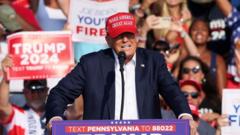Brazilian President Lula da Silva has declared that his government is ready to impose reciprocal tariffs in response to threats from U.S. President Donald Trump, who proposed a steep 50% import tax on Brazilian goods starting August 1. Trump's proposal follows Brazil's treatment of former President Jair Bolsonaro, whom he has characterized as a revered figure facing a “witch hunt.” Lula has firmly rejected these allegations, asserting Brazil's sovereignty and challenging the U.S. trade narrative.
**Brazil Prepares to Respond to Trump's Proposed Tariffs Amid Political Tensions**

**Brazil Prepares to Respond to Trump's Proposed Tariffs Amid Political Tensions**
Brazilian President Luiz Inácio Lula da Silva is poised to retaliate against potential U.S. tariffs, as President Trump threatens a significant import tax.
In a defiant statement on social media, Lula emphasized Brazil's independence in navigating its trade relations and ensured that any unilateral tariff increases would provoke an equal response from Brazil. While acknowledging the potential economic ramifications of such a tariff hike, Lula countered Trump's claims about the U.S. trade deficit with Brazil, backing his assertions with U.S. government figures.
Trump's threats are not limited to Brazil; he has also warned other nations, including Japan and South Korea, though Brazil's situation uniquely intertwines political dynamics with trade policy, as it addresses ongoing support for Bolsonaro amid his legal challenges. The backdrop of these tensions highlights a complicated intersection of economics and geopolitics, where leaders of both nations may utilize the situation to bolster domestic support.
Experts suggest that while the tariff threats may complicate trade, they may inadvertently strengthen Lula’s position domestically by rallying nationalistic sentiments against perceived foreign intervention. Political commentators observe that similar confrontations with Trump have previously yielded electoral boosts for other leaders in the region.
The future of U.S.-Brazil trade relations hangs in the balance, with both leaders determined to assert their national interests in a heated geopolitical climate.
Trump's threats are not limited to Brazil; he has also warned other nations, including Japan and South Korea, though Brazil's situation uniquely intertwines political dynamics with trade policy, as it addresses ongoing support for Bolsonaro amid his legal challenges. The backdrop of these tensions highlights a complicated intersection of economics and geopolitics, where leaders of both nations may utilize the situation to bolster domestic support.
Experts suggest that while the tariff threats may complicate trade, they may inadvertently strengthen Lula’s position domestically by rallying nationalistic sentiments against perceived foreign intervention. Political commentators observe that similar confrontations with Trump have previously yielded electoral boosts for other leaders in the region.
The future of U.S.-Brazil trade relations hangs in the balance, with both leaders determined to assert their national interests in a heated geopolitical climate.




















